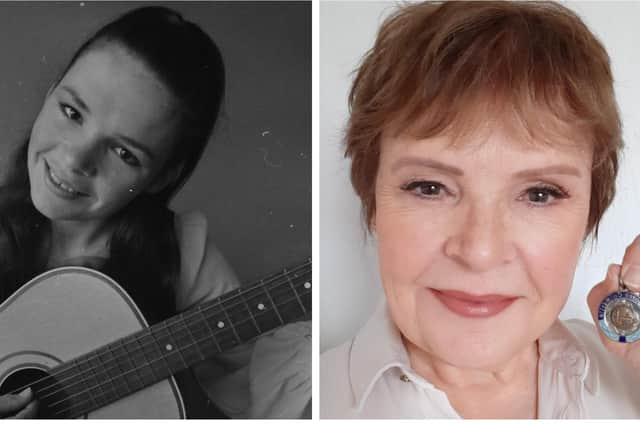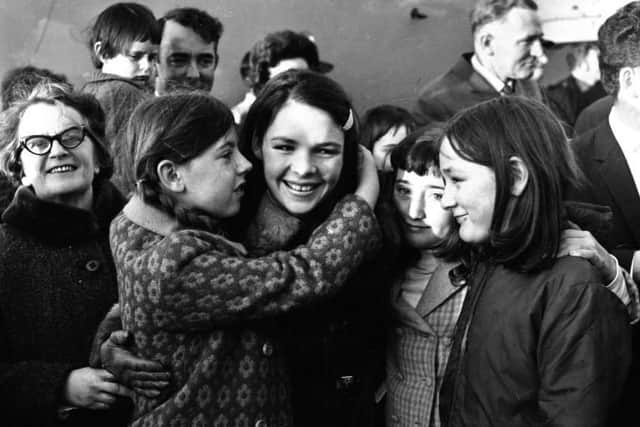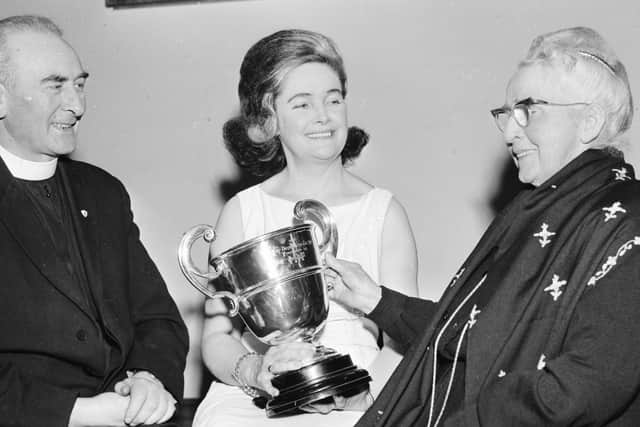Eurovision winner Dana: ‘The feis is a treasure house of memories’
and live on Freeview channel 276
That single alone sold two million copies across the globe, topped the Irish and UK charts and set in motion a string of charts hits and highly acclaimed albums throughout the 1970s.
Almost a decade later, the visit of Pope John Paul II to Ireland in 1979 inspired Dana with her husband to write ‘Totus Tuus’ and opened up another avenue into the Catholic music market. It was a venture that again proved highly successful with the release of songs such as ‘Lady of Knock’.
Advertisement
Hide AdAdvertisement
Hide AdHowever, some years before that in 1971 Dana played a girl from the travelling community in the film ‘Flight of the Doves’ alongside Ron Moody and Jack Wild. In 1974, she filmed the series ‘A Day with Dana’ followed by ‘Wake Up Sunday’ in 1979 for BBC television and in 1977 Dana presented ‘I Believe in Music’ for BBC radio. In the ensuing years there were many summer seasons at seaside resorts, pantomimes as well as extensive performances at cabaret venues, the Royal Albert Hall, the Royal Festival Hall and a week of sell-out shows at the London Palladium. There were also the years of raising four children, presenting a series of Catholic music based television programmes in the USA and an eight year stint as a Member of the European Parliament.


In 2019 returned to the recording studio and her first album in many years called ‘My Time’ was released in November that year.
So, for obvious reasons Dana is of course most recognised as a singer but her voice was not initially her principal instrument when she began performing at a very tender age.
“I suppose in a way the piano was my main instrument. Everybody sang in Derry as we know and I sang in all the competitions and our school St Eugene’s sang every year in the Gregorian chant. So I was part of the choir and then we did Irish songs as well.
Advertisement
Hide AdAdvertisement
Hide Ad“And then as a solo singer, a big memory for me was the Girls 10-12 solo competition. I think there were around 120 entries. I sang in that and once I had done my bit of course the main fun of the feis was running up and down the corridor outside the big hall in the Guildhall where there were trestle tables set up with sweets.


“So, I was out there running around with all my friends and we were having a ball and I didn’t get a recall. I assumed that I didn’t have a hope in hell. But, I wasn’t a bit worried because there was such excitement at the feis.
“I think I was very lucky that my parents were both musicians – my father professionally, but my mother never until the day she died went to bed without playing the piano. She was the one who encouraged us in the piano and singing. Every year she used to say ‘if you win don’t get a big head because there’s always somebody better and if you lose don’t get upset because there’s always somebody worse’. As you know in the feis, one year you’d win and the next year you’d be beaten into the ground. It was a tremendous learning place.
“Anyway, I was a bit disappointed that I didn’t get a recall at least. I was out running up and down the corridor and buying sweets and laughing and the next minute somebody grabbed me by the shoulder and said ‘we’ve been searching everywhere for you’ and I won it. And I was just shocked. Miss Butcher was the teacher at St Eugene’s who put all the girls through their singing and in the next class we had she gave me a little bag of caramels that she got from the wee paper and sweet shop across the street from St Eugene’s. I think it’s still there. They were Walkers Toffees. That nearly meant as much to me as winning the competition itself. That was a big, big memory for me of the feis,” Dana said.
Advertisement
Hide AdAdvertisement
Hide AdBeyond the first ventures at the feis through primary school, Dana decided that she wanted to formally study piano. It was this decision that led to her encounters with legendary musical figures in Derry who also had rock solid connections to Feis Doire Colmcille.


She said: “I studied piano with Mrs Cafolla – her daughter Roma was a very talented girl. As I got older I went to classes with Mr David Fulton who had been a classical pianist himself. I wanted to teach music so I went up to A level’s with Music and English Literature, but it was piano that I was most interested in. I never studied singing. Other vivid memories I have are of James MacCafferty putting me through Irish songs and Mrs Edward Henry O’Doherty. I went to her a few times and she was so kind. Any of us she knew, and most of us weren’t native Irish speakers, she’d almost stand you at her elbow while she played the piano. And, she’d whisper the words to you so you didn’t forget them.
“My mother was a supporter of the feis all the way through her own life and that followed through with the grandchildren. My brother John brought his own kids over for every year. Every year they were in the feis. Of course I was always in panto, or summer season or I was travelling and it was hard for me to get my children to the feis. But every year John’s children were in the feis and it stood by them because they’ve done so well as a professional music group.”
Dana is also firmly of the belief that the lessons learned as a child at the feis also became of great value to her as she made her way through the world of professional showbusiness.
Advertisement
Hide AdAdvertisement
Hide Ad“I think that is very much the case. When I’d be working with a company for example, I always had a sense that I had learned from the feis, that although we were fierce competitors we were also friends.


“I think it also crossed all divides. You didn’t worry about which school or what religion or what town anyone came from. Then I’d go to Moville Feis or Buncrana Feis and meet more people and you became friends and stayed friends but stayed fierce competitors at the same time.
“I think it was a great lesson in life, never mind as a professional singer. Basically, there is always somebody better than you and there’s always somebody worse than you and that keeps your feet on the ground. And, the other thing is to be glad for somebody else when they win. That was another thing that was drummed into us from we were little. It’s better to be a good winner than a bad loser. These are the phrases that I learned going into the feis and that I have repeated to my own children,” Dana said.
Often, feis competitors grew to have a favourite venue to perform in. There have been many halls in the city put to use for that reason in the last century. And Dana, like many others, had a distinct favourite.
Advertisement
Hide AdAdvertisement
Hide AdShe said: “When I was in the feis they didn’t use St Columb’s Hall. That was the place where I would stand outside the stage door and watch the big acts going in for the talent competition that was held every year. And, you literally felt like you were looking in on wonderland. I’d say the first place I ever sang in a talent competition was St Columb’s Hall. I was about six. So that for me wasn’t the feis. The Guildhall for me was the feis. Of course, it was terrifying to walk up those steps and onto the stage. It was a lonely walk. But, the good thing was you couldn’t see the whites of people’s eyes. I could see my mother in the front row who would sing every line with me. You always knew whose mother was there because of that, because you could see them singing every word. In the Minor Hall you were so close to people and that was more daunting I think. In my memory of it you were too close.
“I think one of the highlights of the feis was the prize winner’s concert at the end of the week. Oh my God, that was just incredible. You’d be lucky to even get a seat in the little raised area at the back of the hall. People used to bang their feet on the ground because they couldn’t clap loud enough it was just unbelievable. I loved that. And, then you’d see all the disciplines and of course one of the stars of that show was Cissie Parlour. Not only did she sound the part, she looked the part. The way she held herself – she was a star. Cissie Parlour is a lifelong memory for me.
“Then of course there were the Irish dancers. I tell you what, the stance of an Irish dancer would take you into anywhere because it’s a regal look. There was the DeGlin School of Dancing and Brendan DeGlin is one of my first memories of the feis and Mary McLaughlin who was married to Don O’Doherty. She was a beautiful woman – a beautiful woman.”
Another source of excitement and trepidation for musical competitors at the feis came in the build-up to the practical business of performing. “There was great anticipation waiting to see what the test pieces were, if it was piano or singing. Then you’d go up to Philip’s in Shipquay Street to order the sheet music and then the gasps when you realised how difficult it was. So there was all of that going on. Then you’d start into the practising of it. We had a great rule in or house that if you practised the piano you didn’t have to wash the dishes and you could stay up later. So I was great at practising.
Advertisement
Hide AdAdvertisement
Hide Ad“Our house was always just full of musicians – all the time. So there was always practising and going to music classes with your teacher. The first step was working out your fingering. That was the first step before you play a piano.
“All of that was part of the preparation. It was like fixing the wiring and the plumbing in your house before you paint the walls. So by the time it got to the feis itself you were ready.
“Maybe for girls there was more emphasis on what you were going to wear and whether you’d have your hair up or down. It was a great place to meet especially as teenagers. It was wonderful. You had to look your best you know. There was a ritual to it and it was a very healthy ritual in that your mind was occupied. Honest to God, I truly never remember being bored because I had constant classes – if it wasn’t dancing it was piano. I actually got third prize in violin one year – but there was only three in the competition. I gave up the violin after that,” Dana laughed.
“It was a very healthy lifestyle. You were always with a crowd of friends. There was the piano duets, the singing duets there was the choir. It was a really healthy, holistic kind of engagement. You weren’t stuck on your own with a computer or a phone. It was a great way to grow up,” she added.
Advertisement
Hide AdAdvertisement
Hide AdDana also expressed pride in coming from a city that for some reason seems to have music ingrained in its DNA and has produced so many talented and respected performers in many branches of the arts.
“You’d have to take pride in that wouldn’t you. It was a wonderful place to grow up. I mean everybody has sad memories at times but honestly my memories of Derry are really good. It was a very happy place to grow up in. I never remember being afraid. I remember walking back from Midnight Mass one Christmas with my cousin. It was after 12 o’clock and the snow was on the ground and we just walked for about an hour-and-a-half and we never had to look behind us even to wonder if there was anybody there. It was a safe and a happy city because I think music and jut the common bond that it created among the people was very good and very healing for a community.
“I think it’s good to have a goal to reach and as individual musicians most times your goal is your next exam and reaching that next milestone. It can be quite insular, but because of the feis and all the different aspects of the feis – from the solo, to the duet, to the trios to the choir to the solo dancing to the group dancing – there was a real involvement with more than yourself. And, you were able to make comparisons and you were able to say ‘well, next year I am definitely going to do better’. There was also the fact that there was a healthy competitiveness. Healthy because as I said, you might win this year but get knocked into the ground next year. But, you could pick yourself up and say ‘right, I’m going to get this’. Or you may have been one of those people who had a slow slog until you won it.
“But, it didn’t matter because there were other people sitting alongside you who didn’t win either. So it was a healthy competitiveness and not just insular to your own school of music or dancing. There were different schools of music and different schools of dancing, there were different communities, there were different towns competing. So it wasn’t insular for Derry.
Advertisement
Hide AdAdvertisement
Hide Ad“I just can’t speak highly enough about the feis because I believe it’s been a treasure house for young musicians, dancers or singers for performers coming up for experience, for learning but also a treasure house of memories.”